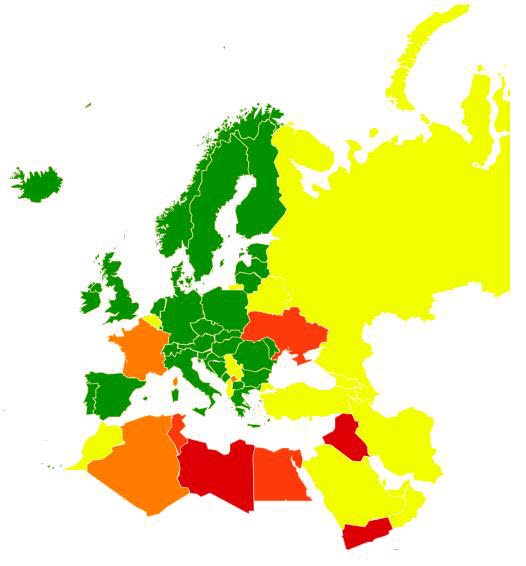European Countries & Muslim Threats
People wishing to travel should check their local Department of Foreign Affairs for the most up to date cautions and alerts for travels. With recent events in France and Belgium and an growing problem with Muslim unrest in popular countries around the Mediterranean Sea, more guides and maps are being created to highlight which are the safest countries to visit when large terror attacks are occurring.
Changes to the terrorist attack level will change the safety factor for a country. At the end of November 2015 the level of safety in France has been downgraded so travelers should always check recent alerts to understand the risks of travel during times when Muslim terror attacks are becoming more frequent and deadly.
This map has been created to illustrate the different security status given to countries in Europe and North Africa, in the light of recent events, color-coding the levels based on a five-point ‘Security Status’ scale.
GREEN = Take Normal Precautions
Visitors to the vast majority of countries in Europe, including Ireland and Great Britain, are advised to take normal precautions. However, regarding Spain, this Green status doesn’t always translate in to a negligible threat level. Spain is one of the world’s most popular travel destinations and the Spanish Government has recently increased its assessed level of the threat of a terrorist attack in Spain from “medium” (level three) to “high” (level four). Citizens should increase their security awareness when visiting Spain.
YELLOW = Exercise Caution
Exercise caution in nine European countries: Albania, Armenia, Azerbaijan, Belarus, Belgium, Georgia, Russia, Serbia and Turkey.This security status also applies to Iran, as well as popular holiday destinations including Morocco and the UAE (where Dubai and Abu Dhabi are located).Belgium is the most recent upgrade to this second-level status, with the UK Foreign & Commonwealth Office (FCO) now indicating that a terrorist attack is “possible and likely” in the country.
ORANGE = Excercise Extreme Caution
Travels should “exercise extreme caution” when visiting or travelling in France following the Paris attacks of November 13. This current rating puts France alongside Kosovo as just one of two European countries given the third-highest rating for caution for vacationers and travellers in the country. There is still a global risk of indiscriminate terrorist attacks, which could be against civilian targets, including places frequented by tourists and expatriates.
RED = Avoid Non Essential Travel
Ukraine is the only European country to which most travelers are suggested to avoid non-essential travel – specifically Crimea and the Eastern region.The same is recommended for Tunisia, the scene of two terrorist attacks this year, and most of Egypt – “due to a heightened threat of terrorist incidents” – with minor exceptions including Luxor, Aswan, Abu Simbel and Sharm El Sheikh, where citizens are advised to exercise caution and to avoid traveling outside the tourist resorts where most people stay. Some western airlines are not currently operating to/from Sharm el-Sheikh airport or in Sinai peninsula airspace “until further notice”. When your countries Department of Foreign Affairs advises citizens to avoid non-essential travel, then tour operators must offer refunds or alternative holiday bookings to safe destinations.
DARK RED = Do Not Travel – Extreme Danger
Travel in Iraq, Libya, Syria and Yemen is currently not recommended. Do Not Travel!
Of course the responsibility lies with you as travellers. Despite its best efforts to ensure accurate and up-to-date advice, any Government alert or advisory for travel should not be regarded as definitive in all respects, and they cannot be held responsible for any injuries or loss suffered as a result of following the advice. Terrist arracks can happen without warning and could happen in any place at any time. Use common sense and plan for a safe holiday.
